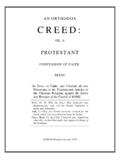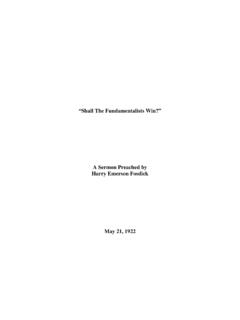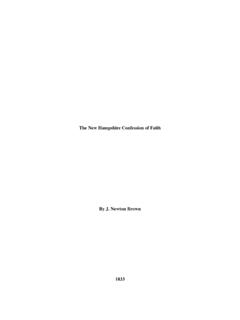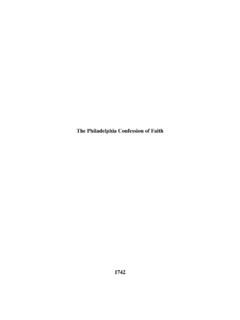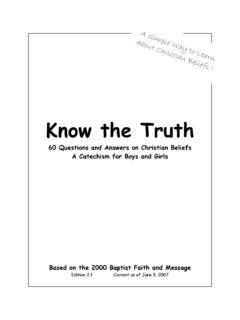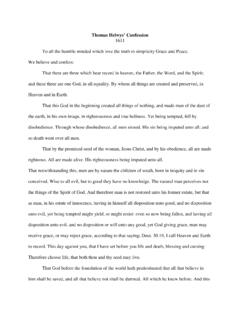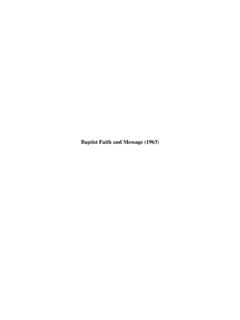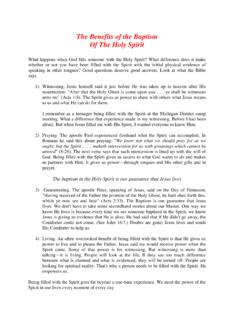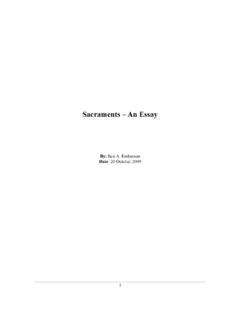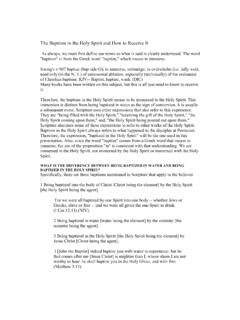Transcription of The Baptist Catechism (Keach’s Catechism)
1 The Baptist Catechism (Keach s Catechism ) 1677 Q. 1. Who is the first and best of beings? A. God is the first and best of beings. (Isaiah 44:6; Psalm 8:1; 97:9) Q. 2. What is the chief end of man? A. Man's chief end is to glorify God and to enjoy Him forever. (1 Cor. 10:31; Psalm 73:25-26) Q. 3. How do we know there is a God? A. The light of nature in man, and the works of God, plainly declare that there is a God; but His Word and Spirit only, do effectually reveal Him unto us for our salvation. (Rom. 1:18-20; Psalm 19:1-2; 2 Tim. 3:15; 1 Cor. 1:21-24; 1 Cor. 2:9-10) Q. 4. What is the Word of God?
2 A. The Scriptures of the Old and New Testaments, being given by divine inspiration, are the Word of God, the only infallible rule of faith and practice. (2 Peter 1:21; 2 Timothy 3:16-17; Isaiah 8:20) Q. 5. How do we know that the Bible is the Word of God? A. The Bible evidences itself to be God's Word by the heavenliness of its doctrine, the unity of its parts, its power to convert sinners and to edify saints; but the Spirit of God only, bearing witness by and with the Scriptures in our hearts, is able fully to persuade us that the Bible is the Word of God. (1 Cor. 2:6-7, 13; Ps. 119:18, 129; Acts 10:43, 26:22; Acts 18:28; Heb 4:12; Ps.)
3 19:7-9; Rom. 15:4; John 16:13-4; 1 John 2:20-27; 2 Cor. 3:14-17) Q. 6. May all men make use of the Scriptures? A. All men are not only permitted, but commanded and exhorted, to read, hear, and understand the Scriptures. (John 5:39; Luke 16:29; Acts 8:28-30; 17:11) Q. 7. What do the Scriptures principally teach? A. The Scriptures principally teach what man is to believe concerning God and what duty God requires of man. (2 Tim. 3:16-17; John 20:31; Acts 24:14; 1 Cor. 10:11; Eccles. 12:13) Q. 8. What is God? A. God is a Spirit, infinite, eternal, and unchangeable in His being, wisdom, power, holiness, justice, goodness and truth.
4 (John 4:24; Ps. 147:5; Ps. 90:2; James 1:17; Rev. 4:8; Ps. 89:14; Exod. 34:6-7; 1 Tim. 1:17) Q. 9. Are there more gods than one? A. There is but one only, the living and true God. (Deut. 6:4; Jeremiah 10:10) Q. 10. How many persons are there in the Godhead? A. There are three persons in the Godhead, the Father, the Son, and the Holy Spirit; and these three are one God, the same in essence, equal in power and glory. (1 Cor. 8:6; John 10:30; John 14:9; Acts 5:3-4; Matt. 28:19; 2 Cor. 13:14) Q. 11. What are the decrees of God? A. The decrees of God are His eternal purpose, according to the counsel of His will, whereby for His own glory, He has fore-ordained whatsoever comes to pass (Eph.)
5 1:11; Rom. 11:36; Dan. 4:35) Q. 12. How does God execute His decrees? A. God executes His decrees in the works of creation and providence. (Gen. 1:1; Rev. 4:11; Matt. 6:26; Acts 14:17) Q. 13. What is the work of creation? A. The work of creation is God's making all things of nothing, by the Word of His power, in the space of six days, and all very good. (Gen. 1:1; Heb. 11:3; Ex. 20:11; Gen. 1:31) Q. 14. How did God create man? A. God created man male and female, after His own image, in knowledge, righteousness, and holiness, with dominion over the creatures. (Gen. 1:27; Col. 3:10; Eph. 4:24; Gen. 1:28) Q.
6 15. What are God's works of providence? A. God's works of providence are His most holy, wise, and powerful preserving and governing all His creatures, and all their actions. (Neh. 9:6; Col. 1:17; Heb. 1:3; Ps. 103:19; Matt. 10:29-30) Q. 16. What special act of providence did God exercise towards man, in the estate wherein he was created? A. When God had created man, He entered into a covenant of works with him, upon condition of perfect obedience, forbidding him to eat of the tree of the knowledge of good and evil, upon pain of death. (Gen. 2:16-17; Gal. 3:12; Rom. 5:12) Q. 17. Did our first parents continue in the estate wherein they were created?
7 A. Our first parents, being left to the freedom of their own will, fell from the estate wherein they were created, by sinning against God. (Gen. 3:6; Eccles. 7:29; Rom. 5:12) Q. 18. What is sin? A. Sin is any want of conformity unto, or transgression of, the law of God. (1 John 3:4; Rom. 5:13) Q. 19. What was the sin whereby our first parents fell from the estate wherein they were created? A. The sin whereby our first parents fell from the estate wherein they were created, was their eating the forbidden fruit. (Gen. 3:6, 12, 13) Q. 20. Did all mankind fall in Adam's first transgression? A. The covenant being made with Adam, not only for himself but for his posterity, all mankind, descending from him by ordinary generation, sinned in him, and fell with him in his first transgression.
8 (1 Cor. 15:21-22; Rom. 5:12, 18-19) Q. 21. Into what estate did the fall bring mankind? A. The fall brought mankind into an estate of sin and misery. (Ps. 51:5; Rom. 5:18-19: Is. 64:6) Q. 22. Wherein consists the sinfulness of that estate whereunto man fell? A. The sinfulness of that estate whereunto man fell, consists in the guilt of Adam's first sin, the want of original righteousness, and the corruption of his whole nature, which is commonly called original sin, together with all actual transgressions which proceed from it. (Rom. 5:19; 3:10; Eph. 2:1; Is. 53:6; Ps. 51:5; Matt. 15:19) Q. 23. What is the misery of that estate whereunto man fell?
9 A. All mankind, by their fall lost communion with God, are under His wrath and curse, and 80 made liable to all the miseries of this life, to death itself, and to the pains of hell forever. (Gen. 3:8,24; Eph. 2:3; Gal. 3:10; Rom. 6:23; Matt. 25:41-46; Ps. 9:1) Q. 24. Did God leave all mankind to perish in the estate of sin and misery? A. God, out of His mere good pleasure, from all eternity, having chosen a people to everlasting life, did enter into a covenant of grace, to deliver them out of the estate of sin and misery, and to bring them into an estate of salvation, by a Redeemer. (Eph. 1:3-4; 2 Thess. 2:13; Rom. 5:21; Acts 13:8; Jer.)
10 31:33) Q. 25. Who is the Redeemer of God's elect? A. The only Redeemer of God's elect is the Lord Jesus Christ, who, being the eternal Son of God, became man, and so was and continues to be God and man, in two distinct natures and one person, forever. (Gal. 3:13; 1 Tim. 2:5; John 1:14; 1 Tim. 3:16; Rom. 9:5; Col. 2:9) Q. 26. How did Christ, being the Son of God, become man? A. Christ, the Son of God became man by taking to himself a true body and a reasonable soul; being conceived by the power of the Holy Spirit in the womb of the Virgin Mary and born of her, yet without sin. (Heb. 2:14; Matt.
